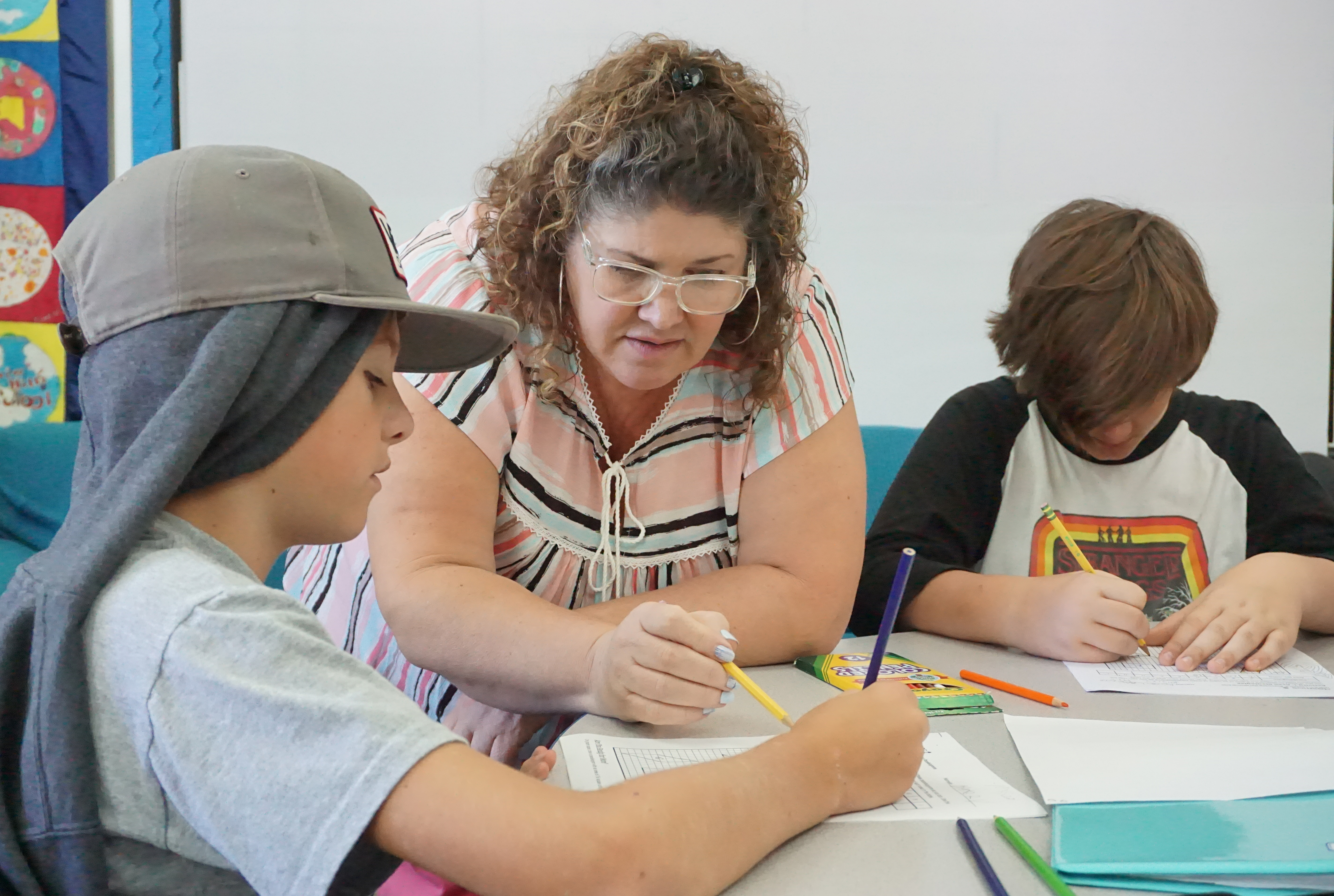Certificate Program Helps Teachers Develop Leadership Skills
Date: 10/04/2022
Author: Nashelly Chavez, Sonoma County Office of Education

Nicole Ellwood helps two students with an assignment at Twin Hills Charter Middle School in Sebastopol on Monday, Oct. 3, 2022. (Photo by Nashelly Chavez)
It’s no coincidence that Nicole Ellwood, an education specialist at Twin Hills Charter Middle School, has worked in special education for the entirety of her 26-year teaching career. There’s something special about working with smaller groups of students and witnessing those “Aha!” moments in a child’s educational journey, she said.
But working at the small Twin Hills Union School District means that she doesn’t have access to a team that’s solely dedicated to special education as is the case at many other school districts, Ellwood said.
While she saw herself as a leader on her campus, she wasn’t interested in becoming an administrator, a typical route many educators take when looking to advance their careers, she added.
Ellwood had the opportunity to address both of those challenges two years ago, when she joined the ranks of the local educators who have gone through SCOE’s Teacher Leadership Certificate Program.
The two-year curriculum program advances the professional development of K-12 teachers with three or more years of experience in Sonoma County who consistently play informal or formal leadership roles in their school or district.
SCOE’s Teacher Leadership Certificate Program began in 2016 and is operated in partnership with the University of California, Davis and the 21st Century California School Leadership Academy grant. SCOE will launch the program’s fourth cohort this month.
The training, which is free to teachers, gave her the opportunity to network with other educators and deepen her skills while remaining in her classroom, Ellwood said.
“Being able to be part of a program where I could develop my leadership skills and feel safe to be who I was, it was just the right timing in my career,” Ellwood said. “The program itself really rejuvenated me and reminded me that there’s more to the education umbrella than just what happens in my classroom everyday.”
The program is based on the Teacher Leader Model Standards, or seven domains that describe the attributes of teacher leadership. Research has linked the leadership practice to improved student outcomes.
That impact was part of the impetus for developing the teacher leadership program, said Sarah Lundy, the director of leadership development for SCOE’s Educational Support Services (ESS) department and one of the leadership program’s facilitators.
Creating a formal advancement opportunity for teachers that doesn’t require them to become administrators, while also leveraging their unique set of skills to solve problems within their classrooms, was another driver for the creation of the program, she said.
“The focus is really on, ‘How do I take the success that I'm experiencing in my classroom and broaden my influence in ways that fit with my personal strengths and desire to grow as a leader?’” Lundy said.
Brulene Zanutto, the young learners program specialist for ESS and another program facilitator, said the course is an opportunity for teachers to explore who they are as leaders and the values that drive their work. Working collaboratively and learning how to engage with others, whether it be members of their cohort or school colleagues, are other important components of the program, Zanutto said.
The program culminates in the participants using their strengths to address a “problem in practice,” or a challenge that they’ve encountered in their own classroom or campus, Lundy said.
Among the projects that have come out of the Teacher Leadership Certificate Program was the creation of a professional learning series for student teachers at Sonoma State University that bridged the gap between the formal training they received to become teachers and the work that a local school district was asking them to do. Another participant established a peer counseling program that paired middle school students with younger students.
“She was able to use the program as an opportunity to reflect on a real need that she was seeing,” Lundy said of the participant.
The program has doubled in size since its inception and school districts that send teachers to the two-year course for the first time often do so again, Lundy said.
Though the application window for the upcoming cohort has closed, teacher leaders interested in applying for the next one will be able to do so in 2024. The application process includes a brief purpose statement and recommendations by current site and district administrators, as well as colleagues.
“We really want to know that students are going to be impacted and every single teacher is going to have a transformational experience,” Lundy said.
Those interested in signing up for the Teacher Leadership Certificate Program can contact Sarah Lundy, SCOE's Director of Leadership Development, at
slundy@scoe.org or 707-522-3069.

